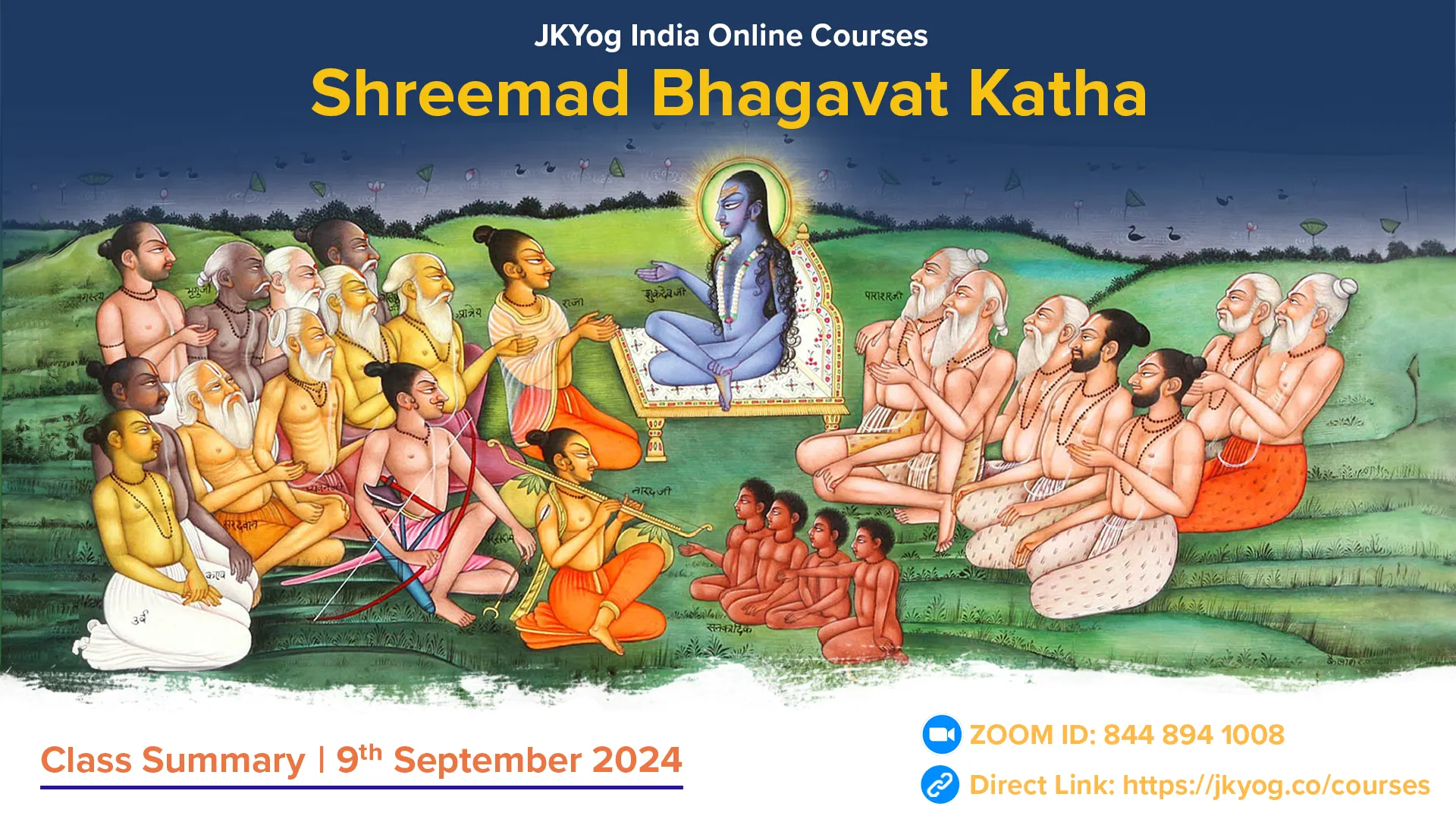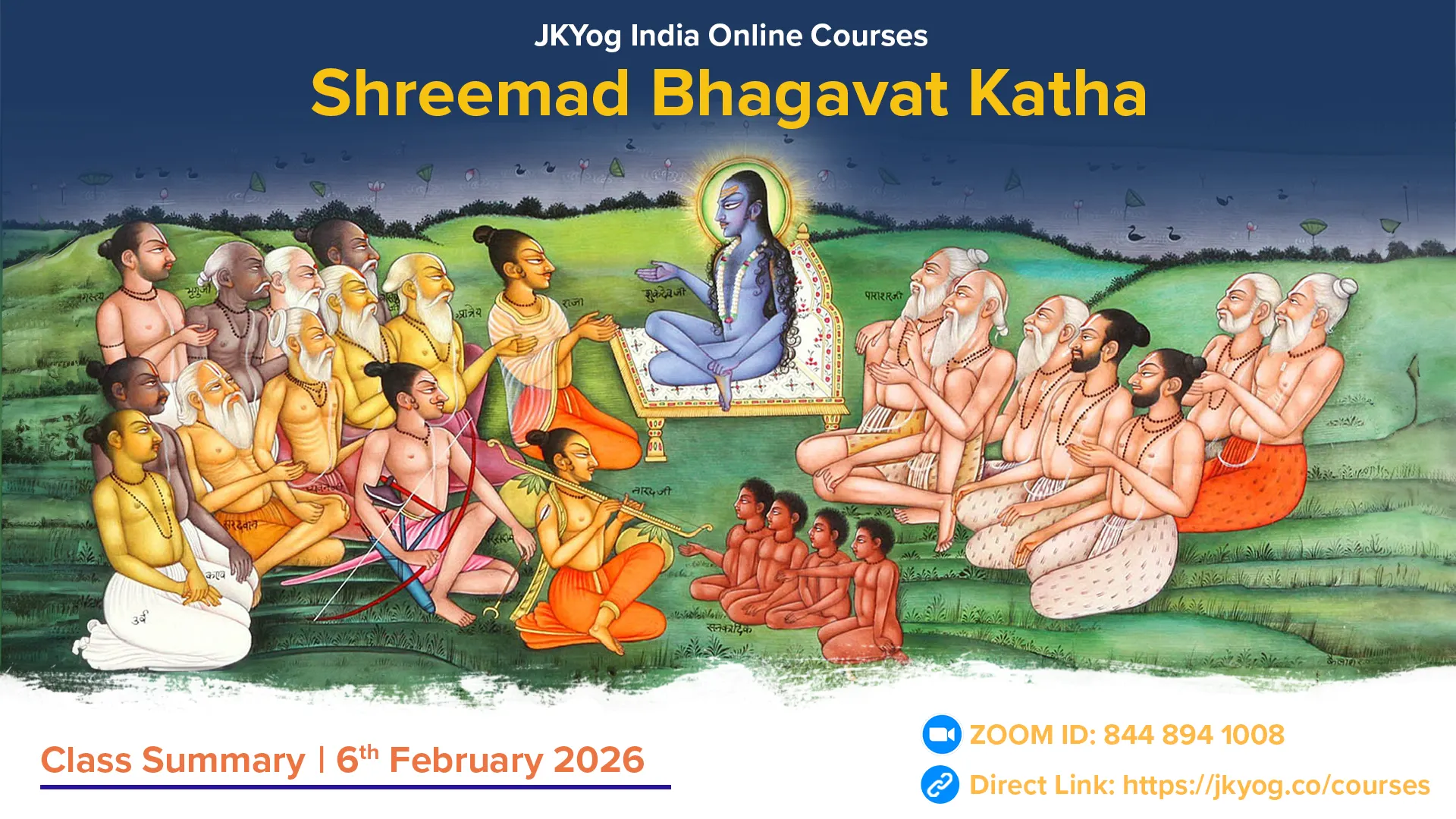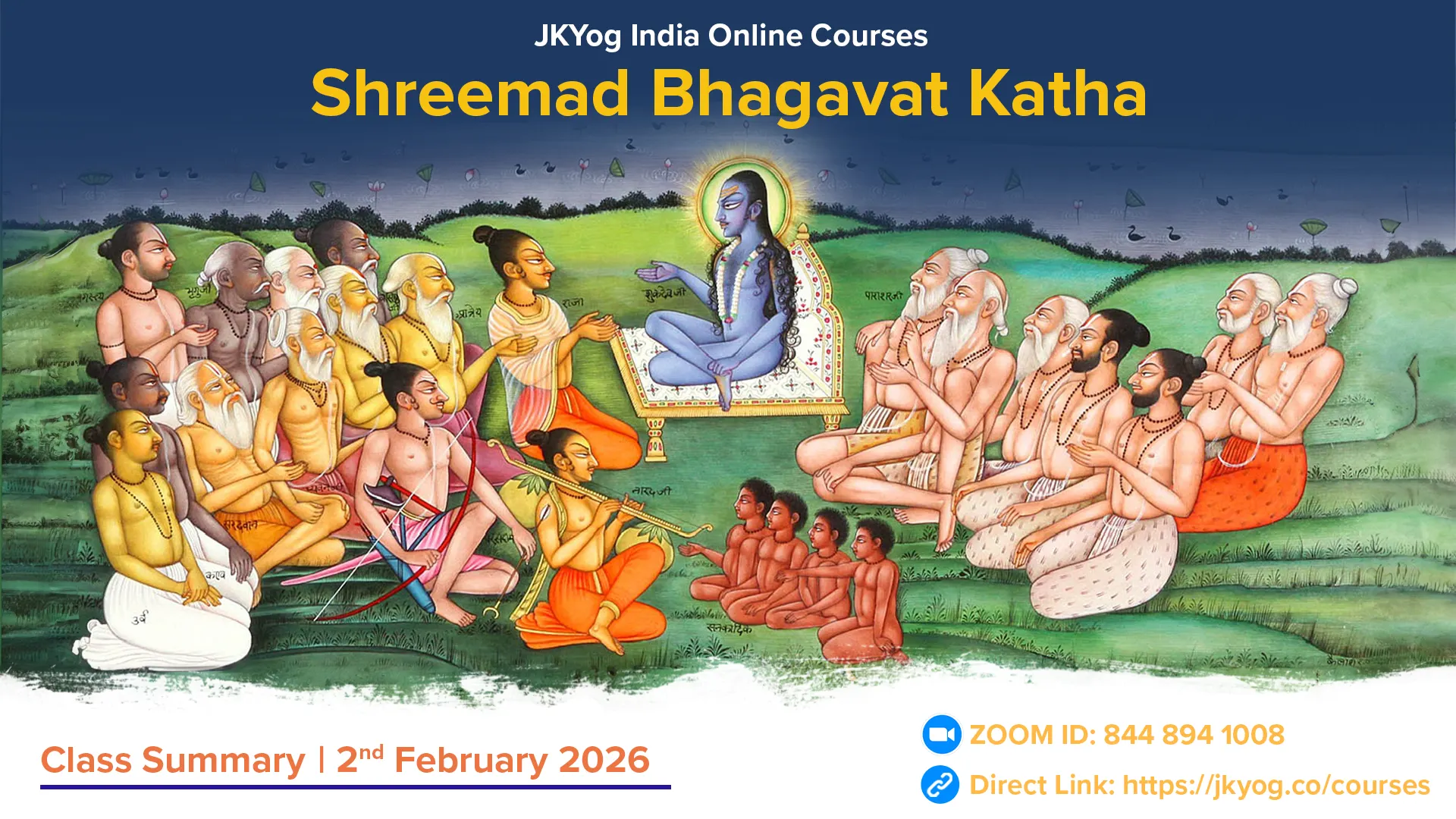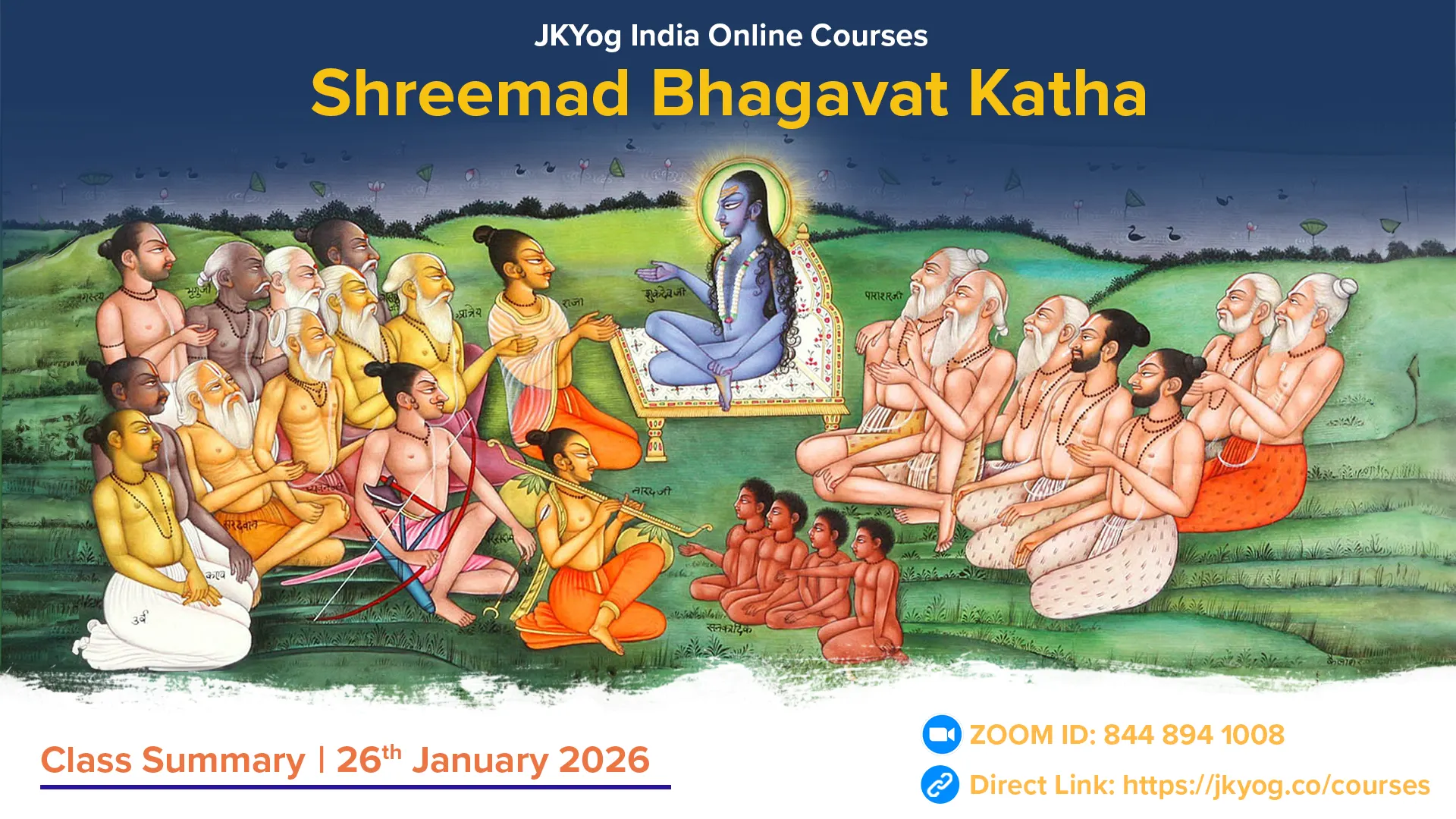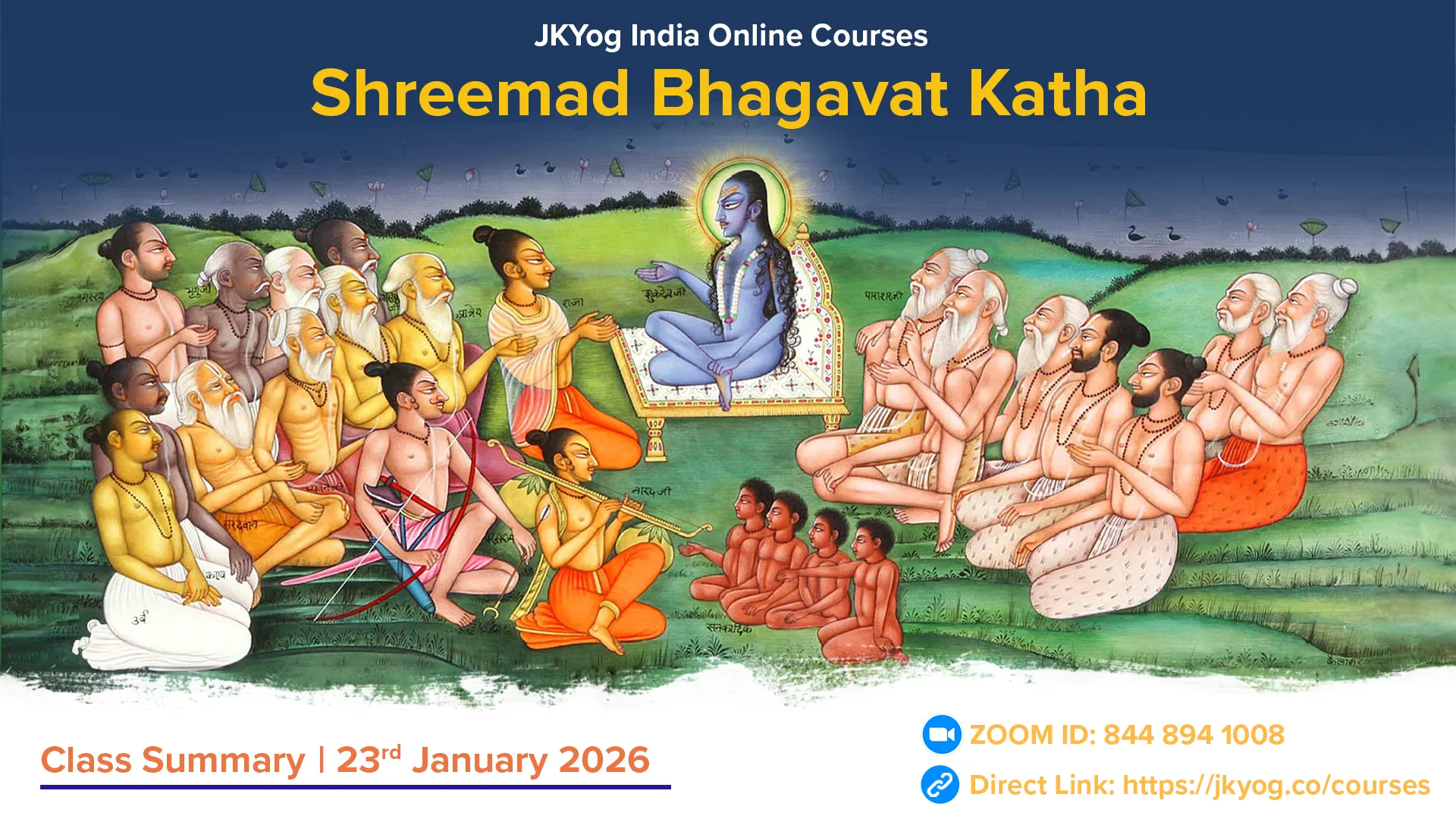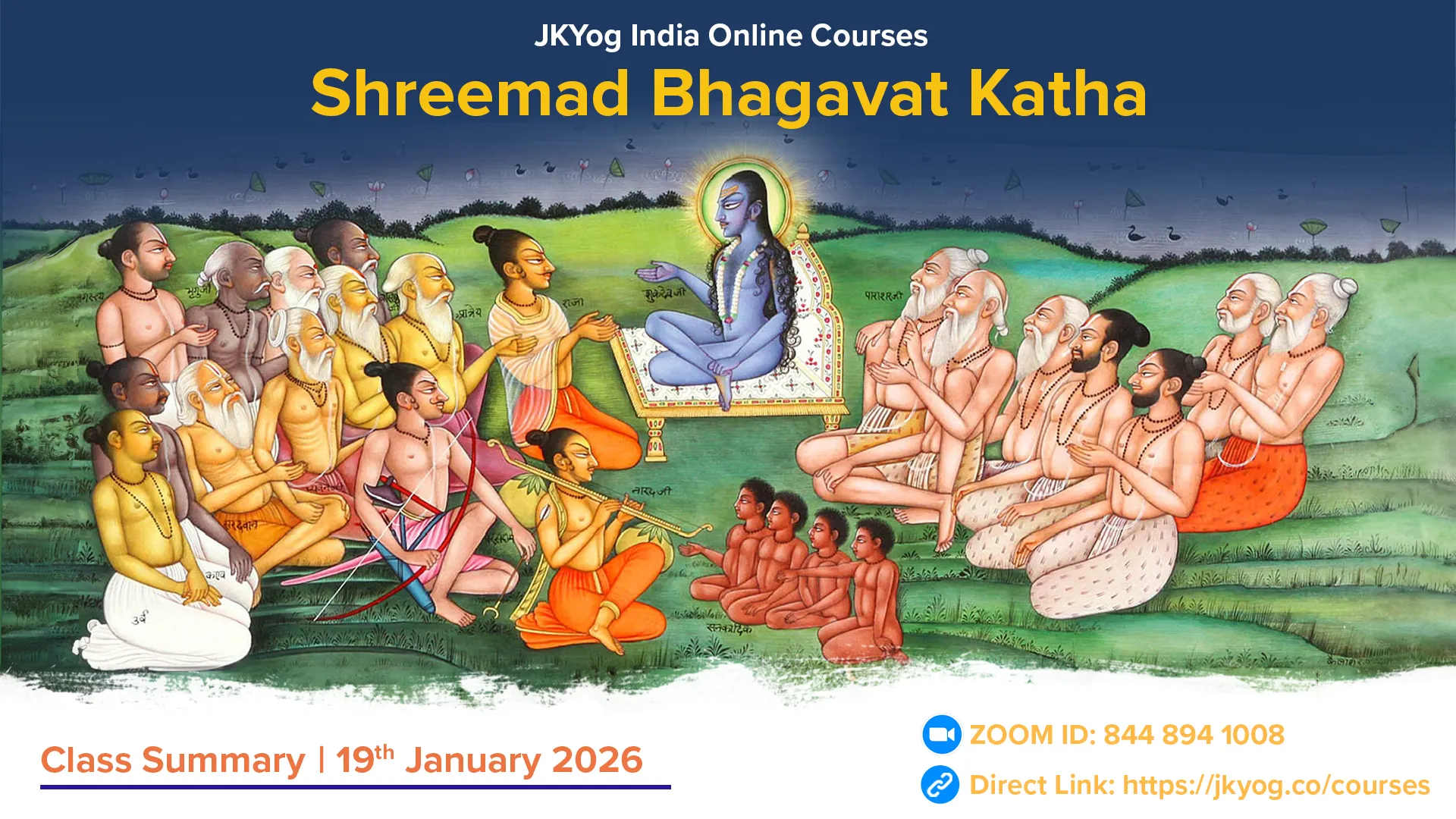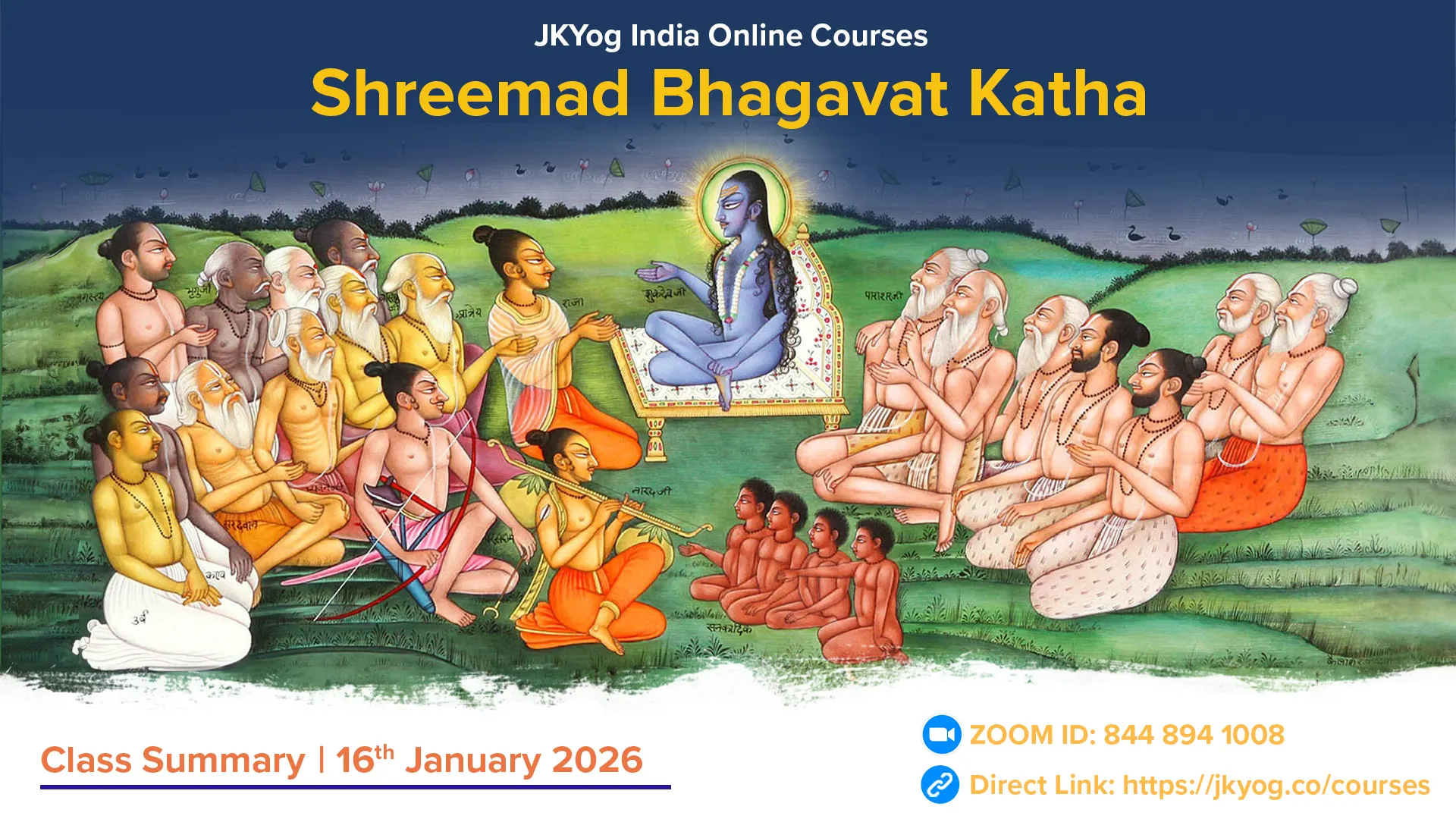Shreemad Bhagavat Mahapuran- Canto: 3, Chapters: 4 to 8
Before withdrawing His divine leelas and destroying the Yadav clan, Bhagwan Shree Krishna instructed Uddhav to go to Badarikashram. However, Uddhav could not endure the separation from Krishna and, unable to stay apart, followed Him to the Prabhas region. There, Uddhav sees Krishna sitting alone on the bank of the Saraswati River. He observes Krishna seated under a small peepal tree, wearing a pitambar (yellow robe) in His chaturbhuj (four-arm) form. Krishna has renounced food and drink, yet He appears blissful. At that moment, Maitreya Muni, a dear friend and devotee of Vyas, arrives there. Krishna lovingly tells Uddhav that He knows his thoughts and will impart to him that rare knowledge.
Krishna reveals that Uddhav, in a previous birth, was a Vasu and had devoted himself to Him. This is Uddhav's final birth, as he has received Krishna's grace in this life. Krishna explains that, due to Uddhav's exclusive devotion, he is blessedwith this rare and solitary vision of Krishna, which is a great fortune.
Shree Krishna then bestows upon Uddhav the supreme 'Bhagavat' knowledge, the same He had given to Brahmaji at the beginning of creation. Uddhav becomes emotional upon hearing Krishna's words; tears flow from his eyes, and he says that he only wishes to serve Krishna's lotus feet, nothing else. After that, Bhagwan Krishna imparts the highest knowledge of His form to Uddhav. After hearing the knowledge of the soul (Atma-tattva) from Krishna, offering prayers, and circumambulating His feet, Uddhav leaves. However, Uddhav's heart becomes deeply agitated by Krishna's separation. Speaking to Vidurji, Uddhavji says that while seeing Krishna had brought him great joy, the pain of separation is now causing him immense sorrow. Uddhav then decides to go to Badrikashram.
Upon hearing the news of the destruction of his beloved relatives from Uddhavji, Vidurji feels great sorrow but calms his grief through wisdom. When Uddhavji is about to leave for Badrikashram, Vidurji requests him to share the supreme knowledge that Krishna has given him. Uddhavji tells him that, per Krishna's instruction, he should seek the service of Maitreya Muni, as Krishna Himself had commanded that Maitreya would impart this knowledge to him. Uddhav's grief, born from separation, is soothed by speaking about Krishna's virtues, and the night on the banks of the Yamuna passes like a moment for him. At dawn, Uddhavji leaves.
King Parikshit then asks Shukdevji how Uddhavji survived when all the warriors of the Vrishni and Bhoja clans perished, and even Shree Hari left His form. Shukdevji explains that Bhagwan Krishna destroys His clan, and as He is about to leave His form, He thinks that Uddhavji is the only one worthy of receiving His knowledge. Uddhav is self-controlled and never swayed by material desires. Thus, he remains to teach people the divine knowledge of Bhagwan. Following Krishna's command, Uddhavji goes to Badrikashram and begins worshipping Krishna through the yog of meditation (Samadhi-yog).
Vidur-Maitreya Dialogue
Shree Krishna manifests His divine form through His Leela and, through Leela, makes It disappear. Upon hearing from Uddhavji about Krishna's disappearance and learning that Krishna has also remembered him, Vidurji becomes emotional with love and begins to weep. After that, Vidurji arrives at Haridwar, meets Maitreya Muni, and asks him about the sorrows of the world and divine wisdom.
Sukhaya karmaani karoti loko na taih sukham vaanya-dupaaramam vaa
Vindeta bhooyastat eva dukham yadatra yuktam bhagavaan vadennah
In this world, everyone performs actions seeking happiness; yet, neither do they attain happiness, nor are their sorrows removed. Instead, their suffering only increases. Therefore, please kindly tell me what is the right course of action in this matter. (Bhagavat 3.5.2)
Vidurji expresses a desire to know about the divine pastimes of Shree Krishna, the creation of the universe, and the deep mysteries of its operation. He laments those who, due to their sins, turn away from the stories of Bhagwan and waste their lives in futile arguments. In response to Vidurji's question, which is aimed at the welfare of all beings, Maitreya Muni praises Vidurji as a true saint, mentioning that he is an avatar of Yamaraj, born as a human due to the curse of Mandavya Rishi. Maitreya Muni explains that only the Supreme Being existed at the beginning of creation. There was no one to witness Him, and He Himself was the observer and the observed. By His will, creation began. Through the power of Maya, the Supreme Being initiated the process of creation.
With the combination of time (Kal), power, and the three gunas (qualities: Sattva, Rajas, and Tamas), Mahattattva (the great principle) came into existence, from which the universe was formed. From Mahattattva, Ahankar emerged, which is of three types: Sattvic, Rajasic, and Tamasic. From Tamasic Ahankar arose the subtle elements and the five Tanmatras (sound, touch, form, taste, and smell).
From the Tanmatras, successively, the five great elements were created—space (Akash), air (Vayu), fire (Agni), water (Jal), and earth (Prithvi). These five elements retain the qualities of the preceding elements. When these five elements failed in performing their respective tasks, they sought refuge in Bhagwan and prayed for assistance in the creation and sustenance of the universe. The gods praised Bhagwan's feet and requested Him to grant them the power and knowledge to create the universe so that all beings could fulfil their duties.
Seeing that Mahattattva and the other elements were disorganised and the work of creation was not progressing, Bhagwan accepted the power of time (Kal-shakti) and entered into the 23 elements (Mahattattva, Ahankar, the five great elements, the five Tanmatras, mind, and senses). He awakened the dormant force that drives creation within them and brought harmony among them. With the combination of these 23 elements, inspired by the Supreme God, the Virat Purush came into existence.
Maitreya Muni further tells Vidurji, "Great sages believe that singing the glories of Bhagwan Hari is the highest purpose of human speech, and for the learned, the greatest use of their ears is to hear the nectar of Bhagwat Katha. Even after meditating for a thousand divine years with his perfected yogic intelligence, Brahmaji could not fully comprehend the boundless greatness of Bhagwan. Therefore, even the most powerful mystics are captivated by Bhagwan's Maya. Its workings are infinite and beyond grasp. If even Bhagwan Himself cannot fathom the entirety of Maya, then how could anyone else possibly understand it?"
Vidurji asks Maitreya Muni the following questions:
- How does Bhagwan, being pure, immutable, and beyond the three gunas (qualities), perform divine leelas? How can there be any relation between Him and qualities or actions?
- If Bhagwan is ever-content and self-satisfied, why does He engage in playful activities?
- Bhagwan creates, sustains, and dissolves the universe through His Maya, but how can He be related to Maya when His knowledge is never obscured?
- In the creation of the universe, Bhagwan creates Mahattattva and its transformations, leading to the birth of the Virat Purush. After that, how does Bhagwan Himself enter into this creation?
- How were the Brahmin and other varnas, the senses, and their objects created from the Virat Purush?
- He seeks knowledge about the sequence of Prajapatis, Manvantaras, and the various powers like Brahma.
- Vidurji also wants to know about the four types of birth—born from the womb (Jarayuj), sweat-born (Swedaj), egg-born (Andaj), and sprouted from the earth (Udbhij).
- He inquires about the pastimes of the guna avatars—Brahma, Vishnu, and Mahadev.
- Vidurji asks for knowledge on the Vedas, Yagyas, the paths of Yog, Jnana, and Tantra Shastras, as well as the effect of deceptive paths and qualities of karma.
- He seeks an understanding of Dharma, Artha, Kama, Moksha, and the principles of charity, austerity, and Shraddha.
- Vidurji also asks about the positions of the planets and stars and their effects.
- He inquires about the types of Pralay (dissolution), the principles that serve Bhagwan during His Yog-nidra, and the elements that merge back into Him.
- Vidurji seeks guidance on the Guru-disciple relationship, the soul's nature, and the Supreme Being's true nature.
- He asks about the methods to attain knowledge, devotion, and detachment.
- Vidurji expresses his experience of being blinded by Maya and delusions and his desire to gain knowledge of the Supreme Truth.
The Birth Story of Brahma
Shree Shukdevji says that Maitreya Muni, pleased by Vidurji's questions, happily declares that he will begin narrating the Shreemad Bhagavat Puran, which Bhagwan Sankarshan Himself had narrated to the sages like Sanak. Bhagwan Sankarshan resides in Patal Lok, where the Sanat kumaras once questioned Him to understand the nature of Brahman. At that time, Bhagwan Shesh was engaged in manasik (mind) worship of Bhagwan Vasudev. The Sanat Kumaras lovingly touched His feet, and Bhagwan Sankarshan narrated the Bhagavat to them. They then passed this knowledge to Sankhyayan Muni. Sankhyayan Muni imparted it to his disciples, Parasharji and Brihaspati. Parasharji, following Pulastya Muni's request, shared it with Maitreya Muni, and now Maitreya Muni narrates it to Vidurji.
Before creation, the entire universe is submerged in water, and Shree Narayan rests on Shesh, immersed in Yog-nidra (cosmic sleep). In concealing His energy, Bhagwan holds the subtle bodies of all beings within Himself, much like fire remains dormant in wood. When the time for creation arrives, the power of time (Kal-shakti) awakens Him, and He observes the countless worlds merged within His body. When His gaze falls upon His subtle form, this subtle element, influenced by the mode of passion (Rajo-gun), emerges from His navel and manifests for the purpose of creation.
Through the power of time, a subtle form emerges from Bhagwan's navel, which rises as a lotus. Bhagwan Vishnu enters this lotus in His form as the all-pervading one (Antaryami), and from it, Brahmaji, the knower of the Vedas, appears. When Brahmaji looks around and finds no worlds in sight, he turns his head in all directions, giving rise to his four faces. Due to the waves of the dissolution's wind and water, Brahmaji is unable to understand the mystery of his origin and the lotus where he is seated. In search of this, Brahmaji enters the water but is unable to find it.
After spending much time searching for his place of origin in the darkness, Brahmaji eventually returns to the lotus, controls his breath, and enters a state of deep meditation (Samadhi). After practising yog for 100 divine years, Brahmaji attains wisdom and sees the source of his existence illuminated within his heart. Brahmaji beholds Bhagwan reclining alone on a massive bed resembling the stem of a lotus, on the primordial waters, with Sheshji's ten thousand hoods spread out like a canopy and crowns adorning His heads.
Brahmaji observes that only five elements are visible: the lotus that emerged from Bhagwan's navel, water, space, air, and his own body. Beyond these, nothing else is seen. Realising that these five elements are the basis for the creation ofbeings, Brahmaji praises Bhagwan and becomes absorbed in the desire to create the worlds as ordained by the Supreme Creator.
Summary: JKYog India Online Class- Shreemad Bhagavat Katha [Hindi]- 09.09.2024

